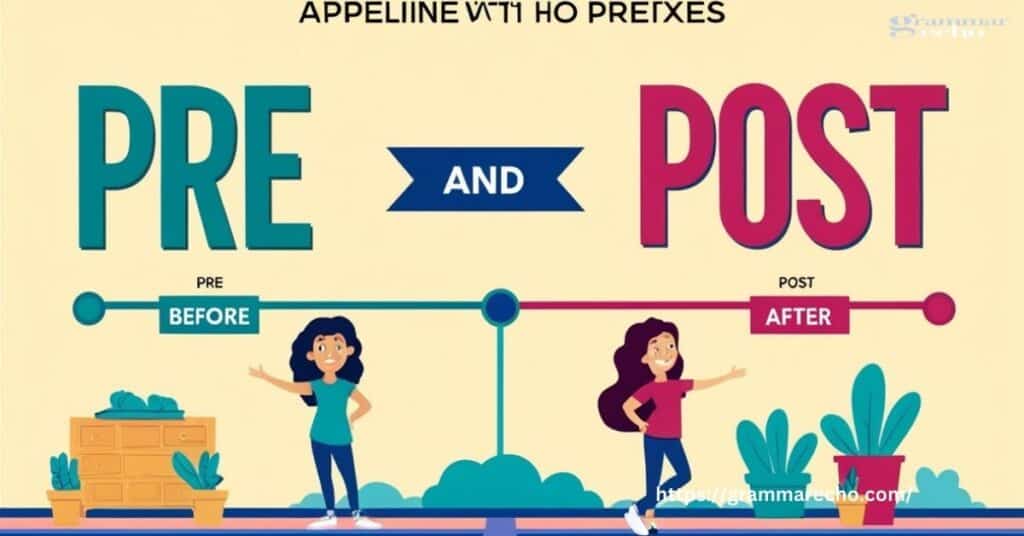Understanding the difference between pre and post is essential for effective communication. These two tiny prefixes pack a significant punch, shaping how we convey timing in various contexts. Whether you’re discussing pre interview strategies or analyzing a post game review, mastering their usage can elevate your writing.
In this article, we’ll explore the nuances of Post Vs Pre through practical examples and engaging scenarios. By the end, you’ll have a clearer grasp of these prefixes, enabling you to use them confidently in your everyday language. Let’s dive into the fascinating world of prefixes and discover their impact on our understanding of events and actions.
Pre Vs Post: Tiny Words, Big Impact!
Understanding Pre and Post

At first glance, pre and post might seem like simple prefixes, but they carry substantial weight in the English language. Pre indicates something that happens before a certain event or action, while post refers to what occurs after. Their usage can alter the meaning of words dramatically.
For instance, consider the term pre-order. This means to order something before it becomes available, like a highly anticipated book. Conversely, post-surgery refers to the care or actions taken after a surgical procedure. Each prefix provides a crucial temporal context that shapes how we understand the word it modifies.
While Handy, Not Quite Antonyms

Although pre and post serve contrasting purposes, they aren’t strict antonyms. Instead, they exist on a timeline that helps us navigate various event sequences. For example, a pre-requisite is something required before a particular course or event, while a post-mortem reflects on the situation after the fact, often to analyze what went wrong.
This is also on our list of: Repetition vs Parallelism: What’s the Difference?
Let’s Get Practical!
To fully grasp the difference between pre and post, let’s explore some practical scenarios:
- Pre-interview: Preparing for an interview involves various tasks like researching the company and practicing answers. This preparation happens before the actual interview date.
- Post-workout: After exercising, individuals often engage in cool-down stretches or consume protein shakes to aid recovery. This is crucial for muscle repair and overall health.
Pre vs Post: The Differences Made Clear
Timeline
The concept of timing is central to understanding these prefixes. Everything revolves around a specific timeline:
- Pre: Events that happen before.
- Post: Events that follow.
For example, pre-heat your oven before placing in a cake. The action of heating occurs before the baking process. In contrast, the post-party cleanup involves tidying up after the festivities have concluded.
Function
The function of these prefixes extends beyond mere timing; they also imply a sense of preparation and aftermath. Pre often involves anticipation and planning, while post signals reflection and results.
| Prefix | Meaning | Example |
| Pre | Before | Pre-enroll for classes to secure your spot. |
| Post | After | Post-game analysis helps teams improve for future matches. |
Remember
When using these prefixes, always think about the event sequence. What comes first? What follows? By keeping this in mind, you can use these terms more effectively in your writing.
Origins of ‘Pre’ and ‘Post’

Pre
The prefix pre originates from the Latin word “prae,” meaning “before.” It has been integrated into various English words to denote actions or states occurring prior to a specified time.
Post
On the other hand, post derives from the Latin “post,” meaning “after.” It serves a similar function in English, indicating what happens following an event or action.
This is also on our list of: Of Course or Ofcourse: Which One Should You Use?
Examples in Context
Pre

- Pre-requisites: Before enrolling in advanced courses, students must complete foundational classes.
- Pre-med students: These individuals often take specific courses before applying to medical school, setting the stage for their future careers.
- Pre-order a book: Fans of a series often pre-order the next installment to ensure they receive it on release day.
- Pre-heat the oven: This essential step ensures the oven reaches the right temperature before you start baking.
Post

- Post-surgery: Patients need to follow specific guidelines for recovery after undergoing surgery.
- Post-party cleanup: After the celebration, it’s time to gather the leftover snacks and dispose of the decorations.
- Post-mortem: After an event’s conclusion, teams often conduct a post-mortem to reflect on what went well and what could be improved.
- Post-game analysis: Coaches and players review game footage to assess performance and strategize for future competitions.
A Final Look
In summary, understanding when to use pre or post can significantly impact your writing and clarity of communication. These prefixes not only set the timing but also reflect the preparation and aftermath of various events. By mastering their usage, you’ll enhance your ability to convey ideas effectively.
FAQs
“Pre” means before. It indicates something that happens prior to an event.
“Post” means after. It refers to actions or situations that occur following an event.
Yes, they can. Terms like “pre-and post-game analysis” are common in discussions about events.

Lily Suzi is an experienced blogger and the voice behind Grammar Echo. With a passion for language and a knack for storytelling, she explores the nuances of grammar and writing in a relatable way. Her insights not only educate but also inspire readers to appreciate the beauty of clear communication.








